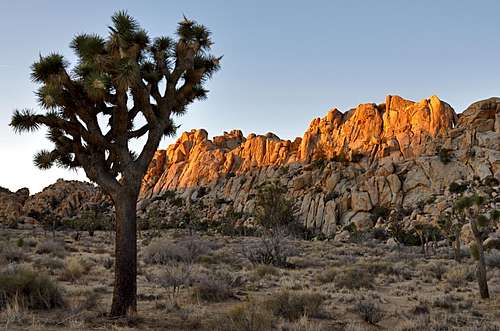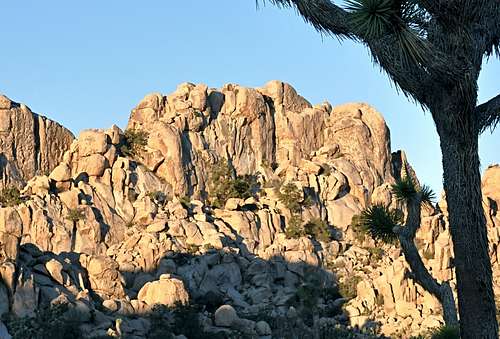-
 6133 Hits
6133 Hits
-
 90.13% Score
90.13% Score
-
 31 Votes
31 Votes
|
|
Area/Range |
|---|---|
|
|
34.02346°N / 116.17853°W |
|
|
Trad Climbing |
|
|
Spring, Summer, Fall, Winter |
|
|
4000 ft / 1219 m |
|
|
Overview
| Note: Joshua Tree National Park is tremendously large and includes thousands of rock formations. The purpose of this page is to bring some sense of organization to many "Mountain & Rock" pages I have posted for the past two years. This particular page may be considered as a mini "Area & Range" page that will be attached to the main Joshua Tree page as a child. |
Directions to Hemingway Buttress area:
From the west enterance to Joshua Tree National Park, drive about eight miles to a large paved parking area with a bathroom. This parking is about two miles past Quail Springs parking, and it has its own sign, “Hemimngway” indicating that you have arrived. Looking toward the west you will see the elongated Hemingway Buttress at a few minutes walking distance.
There are at least two trails heading out toward different nearby formations and an Access Fund trail leading toward the main Hemingway Buttress. Scramble on and around a few large boulders to the base.
Hemingway Buttress
Hemingway ButtressIRS Wall
IRS WallDairy Queen Wall
Dairy Queen WallDihedral Rock
Dihedral RockPlayhouse Rock
Playhouse RockThe history of climbing on Playhouse Rock dates back to the mid 1970s, however, the major route development did not take place until many years later. It seems that the early pioneers had better things to keep them busy than to develop just another insignificant looking hunk of rock. I am, in my little part, just as guilty as the rest of the old time climbers. I climbed on the nearby formations such as Hemingway Buttress
, “IRS Wall” and Dihedral Rock for decades and drove right past the Playhouse Rock without so much as a glimps at it. But now that I’m much older, I understand the significance of having such a beautiful and accessible formation for educational and recreational purposes.
Beside being a great formation for rock climbing classes, Playhouse Rock is an ideal rock to use for your rest day or easy day. You can easily lead a route such as “Final Act, 5.4” to set up top rope for more challenging routes such as “Balancing Act, 5.10.” Playhouse Rock is a low angle, well-featured rock formation and the route possibilities are numerous. The routes may seem too close together, but that may be a good thing for what this rock is used for.







